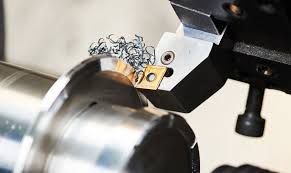In the realm of modern manufacturing, CNC turning parts stand as exemplars of precision craftsmanship and technological advancement. These components, manufactured through Computer Numerical Control (CNC) turning processes, are instrumental in various industries, ranging from automotive to aerospace. The intricacy and accuracy of CNC turning parts make them indispensable in engineering applications where precision and reliability are paramount.
Unveiling CNC Turning Parts
CNC turning parts are intricately machined components produced through CNC turning processes. This manufacturing technique involves the rotation of a workpiece while a cutting tool removes material, shaping it into precise cylindrical geometries. The versatility and accuracy of CNC turning make it suitable for creating a wide array of parts, including shafts, pins, bushings, and more. These parts play critical roles in machinery, equipment, and systems across diverse industries.
Applications Across Industries
The applications of CNC turning parts span across numerous industries, reflecting their versatility and utility. In the automotive sector, CNC turning parts are integral components of engines, transmissions, steering systems, and suspension assemblies. In aerospace, they contribute to aircraft engines, landing gear, and flight control systems. Additionally, CNC turning parts are essential in industries such as electronics, healthcare, renewable energy, and telecommunications, where precision engineering is vital for optimal performance and reliability.
The Machining Process: Precision in Motion
CNC turning involves a meticulous machining process that begins with the design and programming of toolpaths using Computer-Aided Design (CAD) software. Once the design is finalized, the CNC machine operator sets up the workpiece and tooling, adjusting parameters such as spindle speed, feed rate, and depth of cut. During machining, the cutting tool removes material from the rotating workpiece, shaping it according to the programmed specifications. This precise and controlled process ensures dimensional accuracy and consistency in CNC turning parts.
Materials and Machinability
CNC turning parts can be crafted from various materials, each chosen for its specific properties and suitability for the intended application. Common materials include metals such as aluminum, steel, brass, and titanium, prized for their strength, durability, and machinability. Engineering plastics like nylon and polycarbonate are also used for their lightweight and corrosion-resistant properties. The selection of material depends on factors such as mechanical requirements, environmental conditions, and cost considerations.
Quality Assurance and Inspection
Maintaining strict quality standards is paramount in the production of CNC turning parts to ensure optimal performance and reliability. Throughout the manufacturing process, parts undergo comprehensive inspection using precision measurement tools such as calipers, micrometers, and Coordinate Measuring Machines (CMMs). Dimensional accuracy, surface finish, and material integrity are meticulously evaluated to ensure compliance with design specifications and industry standards.
Customization and Prototyping Services
In addition to standard production runs, CNC turning services often offer customization and prototyping capabilities to meet the unique needs of clients. Engineers and designers collaborate with customers to develop bespoke solutions tailored to specific applications, incorporating design modifications, material selection, and performance enhancements as required. Rapid prototyping allows for the validation of designs before full-scale production, reducing time-to-market and minimizing development costs.
Advantages of CNC Turning Parts
CNC turning parts offer numerous advantages over traditional machining methods, making them preferred choices for manufacturers worldwide. Firstly, CNC turning enables high precision and repeatability, ensuring consistent quality across production runs. The automated nature of CNC machining reduces human error and increases efficiency, resulting in faster lead times and lower production costs. Additionally, CNC turning allows for the machining of complex geometries and tight tolerances, expanding design possibilities for engineers and designers.
Environmental Considerations and Sustainability
In recent years, there has been an increasing focus on sustainability and environmental responsibility in manufacturing processes, including CNC turning. Manufacturers are adopting eco-friendly practices such as recycling coolant fluids, optimizing machining parameters to minimize waste, and utilizing energy-efficient equipment. Additionally, the use of sustainable materials and coatings reduces the environmental footprint of CNC turning parts while maintaining performance and durability.
Technological Advancements and Future Trends
Technological advancements continue to drive innovations in CNC turning, enhancing its capabilities and versatility. From advanced tooling materials to real-time monitoring systems, manufacturers are leveraging cutting-edge technologies to improve machining efficiency, accuracy, and reliability. Future trends in CNC turning may include the integration of artificial intelligence (AI) for predictive maintenance, additive manufacturing techniques for hybrid machining processes, and enhanced automation for lights-out manufacturing.
Conclusion
In conclusion, CNC turning parts play a pivotal role in modern manufacturing, offering precision, reliability, and versatility across diverse industries. From automotive to aerospace applications, these meticulously crafted components power machinery, vehicles, and technological advancements. With ongoing advancements in technology and machining capabilities, CNC turning continues to push the boundaries of what is possible, driving innovation and shaping the future of manufacturing.


